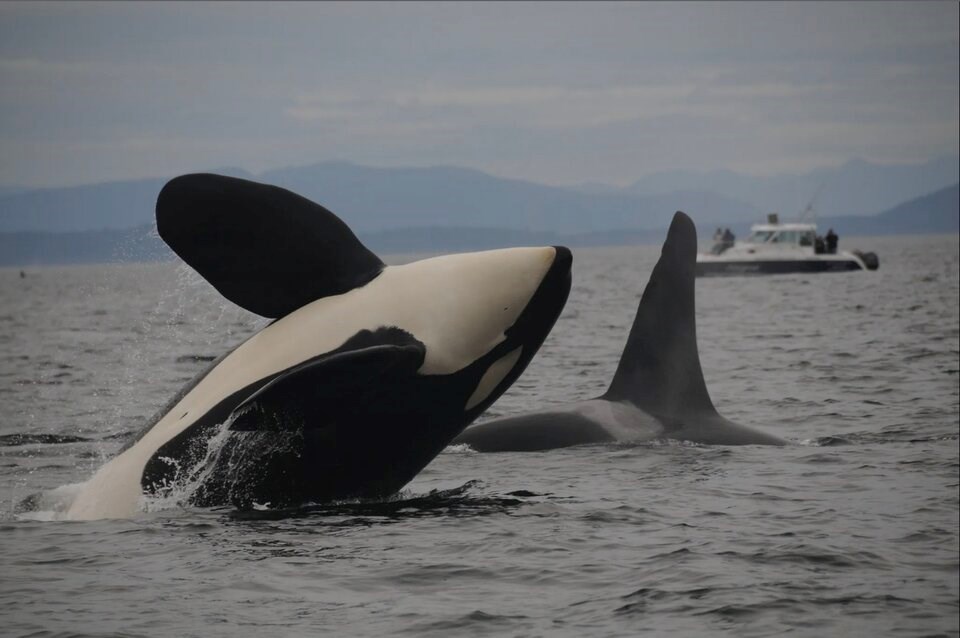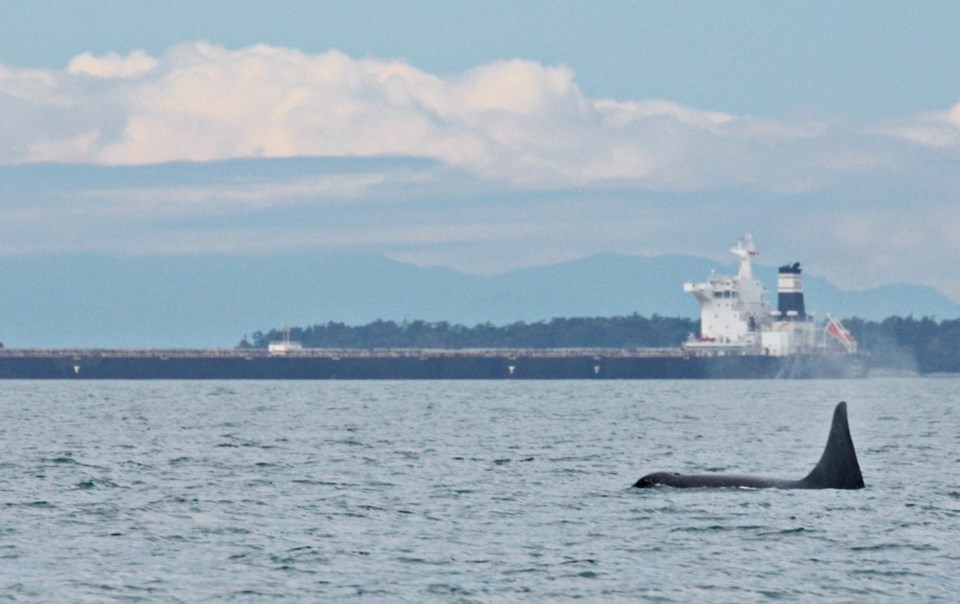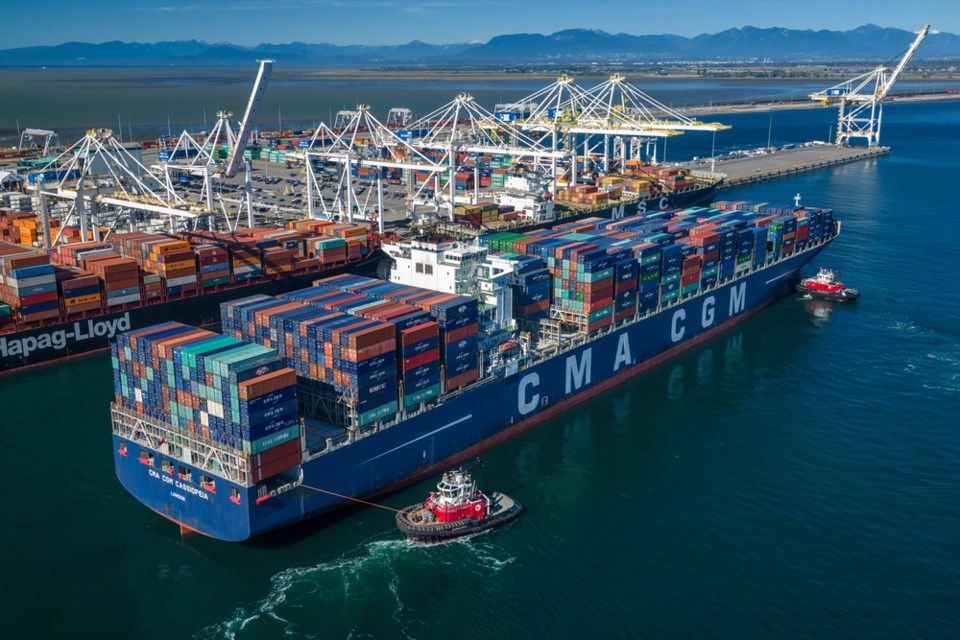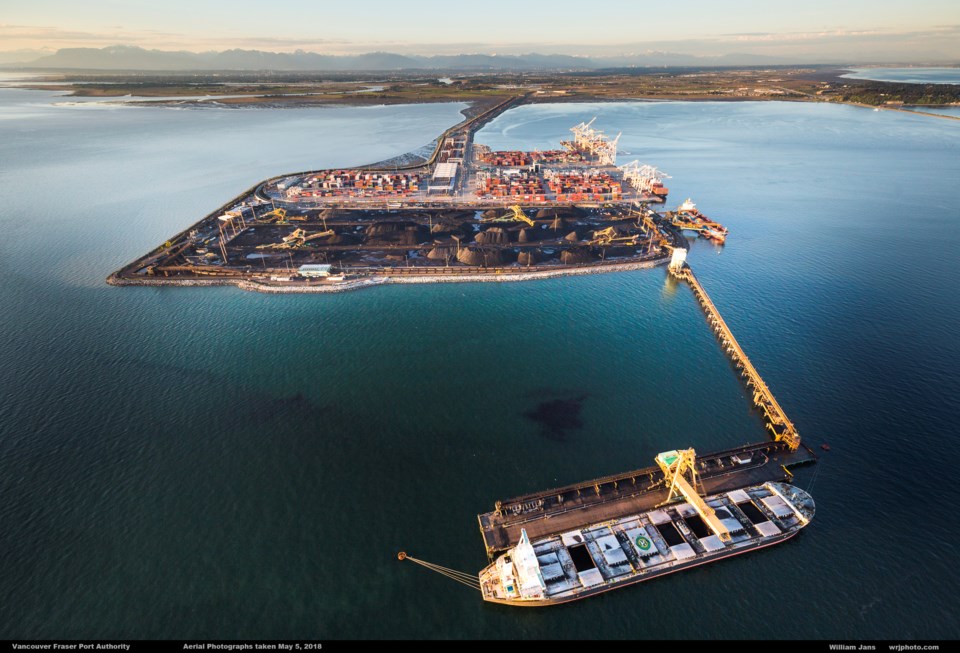A legal challenge to Canada’s approval of a major B.C. port expansion over fears it would further threaten an endangered killer whale population is “fundamentally flawed,” lawyers for the federal government and the Vancouver Fraser Port Authority said Tuesday.
The submissions come 14 months after the federal government approved the Roberts Bank Terminal 2 expansion project in Delta, B.C. — a project that seeks to expand the Deltaport container facility to handle an increase in international trade in an era where container vessels are getting increasingly bigger.
Built on a new man-made island, detractors of the project say it will destroy 177 hectares of vital habitat for juvenile chinook salmon, the preferred prey of the endangered southern resident killer whale. Underwater noise from construction of the facility and its later operation has also led expert panels to conclude that, unmitigated, the expansion could throw off the whales’ ability to forage and have “significant adverse effects” on the species.
But on Tuesday, Attorney General of Canada and Ministry of Environment and Climate Change lawyer Jon Khan told a Vancouver Federal Court that legal arguments raised by four environmental groups ignore the enforcement of 370 mandatory conditions that came with the port expansion’s approval.
Khan told Federal Justice Christine Pallotta that the federal government’s decision was a “discretionary one based on the widest considerations of policy and public interest.”
That public interest includes wider economic benefits — like improving supply chain resilience and boosting international trade — and should lead the court to agree the port expansion approval was “justified in the circumstances,” he said.
“Only the governor-in-council, not this court, is equipped to evaluate such considerations,” Khan told the court.
‘A profound question’
In its second day, arguments in the judicial review hinged on how or even if Canada’s Species at Risk Act (SARA) can restrict project approvals made by the federal government under the Canadian Environmental Assessment Act. That’s the law under which cabinet issued its April 2023 order-in-council advancing the port expansion project into the regulatory phase.
A month later, Georgia Strait Alliance, David Suzuki Foundation, Raincoast Conservation Foundation, and Western Canada Wilderness Committee filed a joint application for judicial review of the case with Canada’s federal court.
In their first day in court Monday, lawyers for the four environmental groups argued cabinet’s approval to expand the country’s largest port lacks “justification, transparency, and intelligibility” and failed to make it clear how it and the environment minister fell into line with the Species at Risk Act.

How could cabinet approve a project that would have “significant adverse effects” on an endangered species protected by the act, they argued.
“An ‘extinction bomb’ is what I call it,” said Charlotte Dawe, Ecojustice’s government relations and campaign specialist.
“Obviously, if there were ever a project that tests if [the government] is willing to put the money where their mouth is, this is it. And they didn't do that.”
The port expansion represents the first time a major industrial project is coming into direct conflict with a species protected as endangered under Canada’s Species at Risk law, said Margot Venton, a staff lawyer and head of the nature program at Ecojustice, the firm representing the applicants.
“It's a pretty profound question in a lot of ways. Is there a floor of protection for endangered species in Canada, or is there not?” she said.
Applicants asking court to be ‘academy of science,’ claims port
On Tuesday, lawyers for the environment minister said his legal responsibility under the Species at Risk Act includes monitoring the effectiveness of protective measures on an ongoing basis — not at a fixed point in time.
“Just because the environmental assessment is now over doesn't mean the minister stops assessing the effectiveness of the conditions or the measures under SARA,” Khan said.
He said lawyers for the four environmental groups had picked a couple of the project conditions and attempted to predict how well they won't work and what they won't lead to in the future.
“Despite what the applicants asserted yesterday, they are asking the court to become an academy of science and prejudging the outcomes of current conditions and measures,” Khan said.
Khan told Justice Pallotta that the court should reject those invitations, find cabinet’s and the minister's decisions are entirely reasonable, and dismiss the application.

‘Going to support Canada's economic growth’
Geoff Cowper, a lawyer for the Vancouver Fraser Port Authority, said his client was proud of the project, its potential for the country and the process that led to its approval — including measures to protect southern resident killer whales.
“Of course, the project is indeed needed…” said Cowper. “The project will provide capacity for increased trade. It's going to support Canada's economic growth.”
“And of course, the flip side of that is, without the project, container demand on the West Coast will exceed practical capacity in the near term. If the capacity is breached, then, of course, that trade will go to U.S. ports, and we’ll lose out on GDP related to that potential trade.”
In submissions to the court, the port authority said the Roberts Bank Terminal 2 expansion project would increase the total container capacity on the West Coast by about one-third. That will allow the terminal to move $100 billion in goods every year, added port spokesperson Frances Tang-Graham in a statement.
The number of vessels arriving in to the region's port facilities is not expected to grow because vessels are getting bigger and so can handle more cargo, according to its submissions from the port authority.
The port says it has also entered into mutual benefit agreements with 26 Indigenous groups, “which have each expressed their consent, support, or — in two cases — non-opposition to the project,” according to submissions from the port. Each group will receive benefits connected to the port expansion.
Port says it will offset environmental damage
Cowper characterized the four environmental groups’ argument as one that looked to “stop the world” — something he said was an incomplete view of the situation and that’s not helpful to people or whales.
Backing the government’s arguments as a correct legal interpretation of federal law, he said the applicants had advanced propositions divorced from legislation.
Cowper defended the more than decade-long approval process as one that has created “a process that will establish an acceptable noise level and means to manage that noise level.”
He pointed to procedures to delay departures of container vessels, reduce underwater noise through monitoring killer whales and their interactions, and slow down vessels near the port.
“The fact is, voluntary efforts can be part of sound conservation practice,” said Cowper.

In an email, Tang-Graham said the port authority will “develop a real-time southern resident killer whale detection program and modify or stop construction activities if they are near.”
“During the terminal’s operation, we will delay daytime unberthing and departure of container vessels when southern resident killer whales are present and use noise reduction technologies such as shore power and quieter tugs,” said Tang-Graham.
The port will also enhance and restore 94 hectares of habitat, including that used by juvenile salmon, the spokesperson said.
Port argues healthy economy funds healthy environmental protection
Cowper said the federal approval of the port expansion project is part of a national conversation over how environmental protection can occur while maintaining “an economy that can actually fuel and fund those preservation measures.”
“It can sound jarring that a project is approved when there are adverse environmental effects that can't be mitigated,” said Cowper.
“The economy is what provides the money, in a basic sense, to allow us to live out our national commitment to conservation.”
Cowper said federal laws recognize all big infrastructure projects cannot be completed without adverse environmental effects. Balancing that with “all the virtues and benefits of the project against those adverse effects” is a job only senior levels of government can do on behalf of national interests.
“That's why it's a cabinet decision,” he said. “That's why it's pointed up to the senior political executive of the country to evaluate the country's interests.”
Lawyers for the applicants rebutted a number of submissions made by the government and the port authority.
Justice Pallotta is expected to weigh the merit of the claims from all sides and render a decision by early 2025.
“I'm going to have to think about your arguments very carefully,” said the judge.






